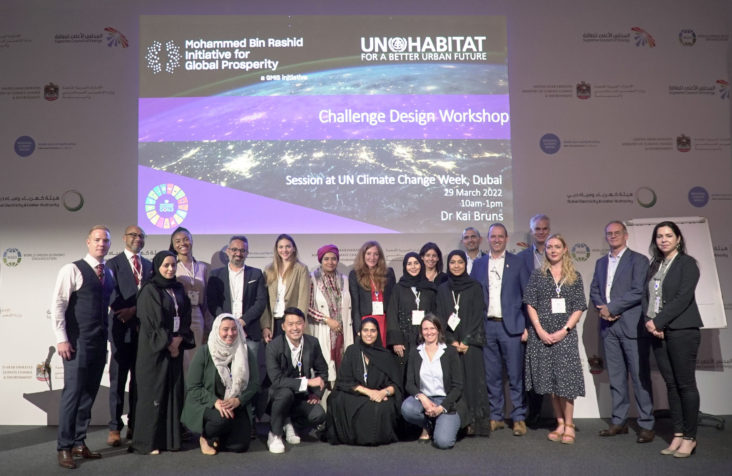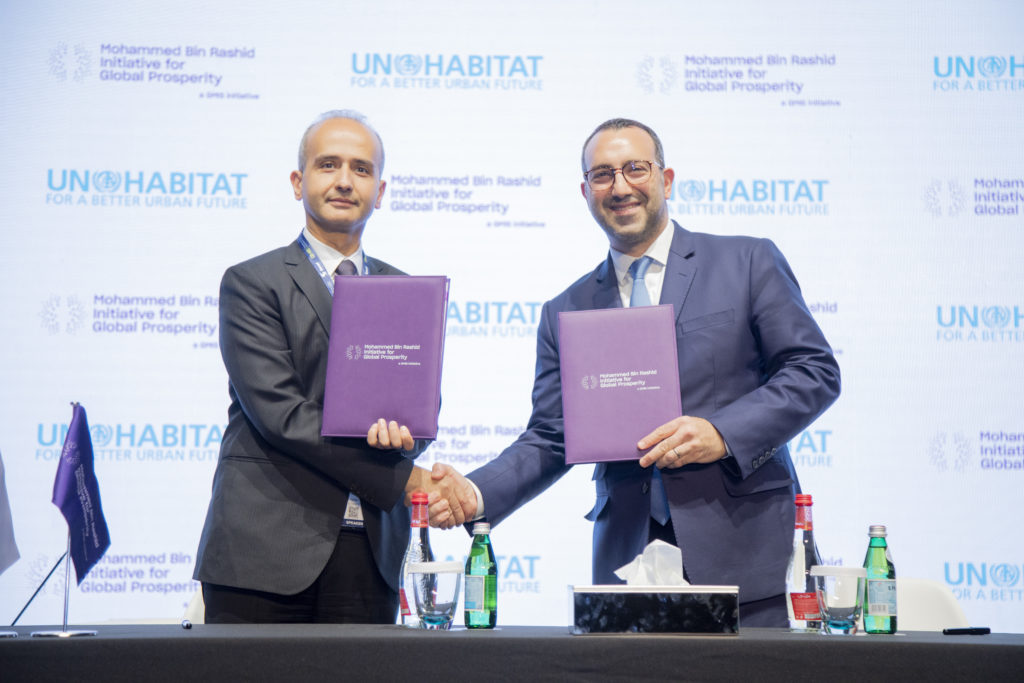Mohammed Bin Rashid Initiative For Global Prosperity And Un-habit At Join Forces To Drive Sustainable Urbanisation

The Mohammed bin Rashid Initiative for Global Prosperity(MBRInitiative) and the United Nations Human Settlements Programme (UN-Habitat) today announced that they have started preparation to launch the first cohort of the Decade of Action Challenge to drive sustainable urbanisation. The two organisations conducted two Challenge Design Workshops, one virtually on March 23 and another in-person on March 29, alongside MENA Climate Week. The workshops were designed to explore the trends and barriers to developing sustainable construction and resilient infrastructure.
More than half of the world’s population is now living in cities, and this proportion is projected to increase to two thirds by 2050.As urbanisation, digitalisation, and climate change increasingly impact the world, there is a growing need for infrastructure and construction to be planned, built, and managed.UN-Habitat’sWorld Cities Report 2020emphasises that growing urbanisation and climate change create complex risks, especially for those cities that already experience poorly planned urban growth, high levels of poverty and unemployment, and a lack of basic services. The report also highlights that cities remain central to advancing Sustainable Development Goals (SDGs), particularly Goal 11 – Sustainable Cities & Communities. In addition, the ongoing impact of the COVID-19 pandemic underscored the importance of having well-designed cities with basic infrastructure available to all, including a robust digital infrastructure.
Erfan Ali, UN-Habitat’s Regional Director for the Arab States, said: “The facts now show that when everyone is included and engaged in cities, they are more prosperous for all. Adequate housing and efficient public infrastructure that are resilient and sustainable are critical for our cities. We are very pleased to be working with the Mohamed Bin Rashid Group on the Decade of Action initiative and not only look forward to new ideas and new partnerships on this but making the best ideas a reality for change on the ground in cities.”
The Challenge Design Workshops brought together policymakers, industrial technology experts, academic representatives, and some of the world’s leading incubators, accelerators, start-ups, and SMEs to engage in design thinking discussions on the most pressing issues faced enhancing the affordability and sustainability of housing, construction, and essential urban services. Discussions at the workshop also identified the stakeholders to lead the change, addressed the governance, policy, and financing gaps,explored ways to foster multi-sector partnerships, and highlighted innovative ideas for affordable housing, infrastructure, and clean technologies.
In collaboration with the UN-Habitat, the Mohammed bin Rashid Initiative for Global Prosperity will analyse the content and results of the interactive workshop discussions to frame an actionable question that will define the first Decade of Action Challenge. The Challenge Question will be presented to the global start-up community to source technological and innovative solutions via submissions on the Initiative’s open innovation platform. The winners will be announced in the last quarter of 2022.
Namir Hourani, Managing Director of Head of the Global Manufacturing and Industrialisation Summit Organising Committee, said: “The Mohammed bin Rashid Initiative for Global Prosperity is committed to harnessing the power of innovation and collaboration to drive positive social impact and sustainable outcomes for the benefit of all. Partnering with UN-Habitat on the Decade of Action Challenge enables us to engage with a global community of innovators to address key challenges in advancing sustainable urbanisation and equitable economic development.
The Challenge Design Workshop brought together a community of like-minded experts in a unified pursuit to unlock efficiencies in the infrastructure and construction sector, contributing to shaping the first Decade of Action Challenge. We look forward to launching the Challenge that will help entice innovators to produce concrete solutions and measurable outcomes that will positively impact local communities and economies.”
The first Challenge Design workshop was held virtually on March 23, 2022, followed by a second workshop held on March 29, 2022, alongside the MENA Climate Week at Atlantis Hotel in Dubai, United Arab Emirates. The workshops gathered senior representatives from a wide range of organisations, including the UAE Ministry of Energy and Infrastructure, HSBC Bank, UN-Habitat, Nakheel Properties, Emirates Nature –WWF, and Mrüna,amongst others. Workshop participants were invited to develop questions that would explore how disruptive technologies and innovation can support building a more resilient infrastructure and construction industry, tackle the emission problems from the construction sector, improve energy efficiency in construction and production of building materials, create employment opportunities in construction, and contribute to boosting the local economy.
The ‘Decade of Action Challenge’ is a ten-year partnership between The Mohammed bin Rashid Initiative for Global Prosperity and UN-Habitat to promote sustainable and inclusive urbanisation through innovative solutions, partnerships, and transformative ideas.The two organisations signed a Memorandum of Understanding to support entrepreneurs and start-ups develop impactful solutions to address the key challenges of urbanisation and advance equitable economic development in cities, in line with the United Nations Sustainable Development Goals (SDGs).
The ten-year partnership was born as a result of the shared vision and long-standing association between the two organisations to make cities more prosperous while creating a global innovation ecosystem of social impact leaders made up of UN entities, governments, entrepreneurs, investors, philanthropists, academia and private sector.




